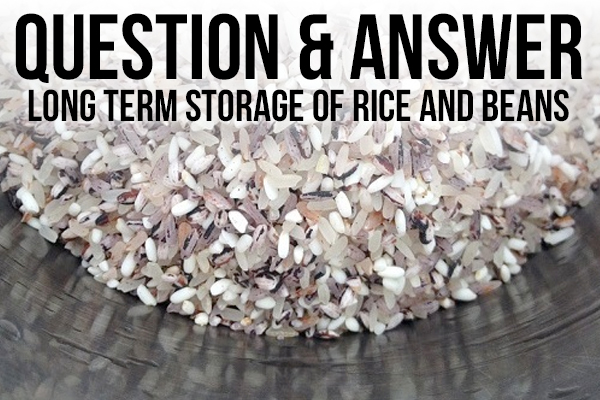
Question from one of our readers:
Do I need to freeze rice and beans before I store them in Mylar bags?
Answer:
Short answer is not necessarily.
Explanation
There are 5 main enemies to food storage; light, moisture, contamination, heat, and infestation.
Proper Mylar pouches (and not the discount shiny plastic versions found online) already provide barrier protection against light, exterior moisture, exterior contamination, and exterior infestation if properly sealed and the appropriate oxygen absorber is used. Good Mylar pouches also provide a solid oxygen barrier which is crucial to placing food in ‘hibernation’ once an O2 absorber is used.
Mylar does not protect against heat and therefore the storage conditions should be cool temperatures if possible.
The Point of Freezing
The reason some people freeze their dry goods prior to sealing is an attempt to kill insects that may be hiding in the food. Most commonly these will be weevils. Weevils have been shown to be viable for years in an O2 deprived environment. Freezing may not kill them or their eggs unless you place the rice in a temperature of 0 degrees Fahrenheit for a period of 3 days. Many consumer freezers are not able to achieve that cold of a temperature. And in many cases when we store 50lbs at a time that would take up a lot of freezer space.
What to Do if You Find Them
If we looked closely at some of the flour we purchase we might find these little critters crawling around but in rice, the eggs are usually hidden in the rice seeds. Weevils have the capability to assume the color of the food they are in. The good news is that they are edible, the not great news is no one cares to eat bugs and if they have settled in, they may have excreted in the food. But that should be obvious if it happened.
If they have found their way into your rice just cook the rice as usual. The boiling water will float them all to the surface where you can skim them off.
For our personal large quantity storage, we have not frozen the food prior to Mylar repackaging.
For reference visit this website: https://hortnews.extension.iastate.edu/rice-weevil-and-granary-weevil
And check out some other articles and food storage:
Yes, You Want Other Food Storage Options
What Does Proper Food Storage Look Like?
=====
Become a Survival Dispatch Insider …
We bring together survival enthusiasts and preppers to share skills and knowledge, so you can enhance your preparedness for emergencies and ensure the safety of you and your community.
The Results You’ll Get …
Our community, courses, and memberships are pretty special. We focus on the ways it will make a huge difference in your life.
Here are a few of the things you’ll be able to do as a member of Survival Dispatch Insider …
1) Improve your emergency preparedness by learning survival skills and strategies from experienced preppers.
2) Build lasting connections with like-minded individuals that share your passion for safety and readiness.
3) Access a wealth of knowledge and resources to assist in protecting you and your community during unexpected situations.
Click HERE to get started.
=====
